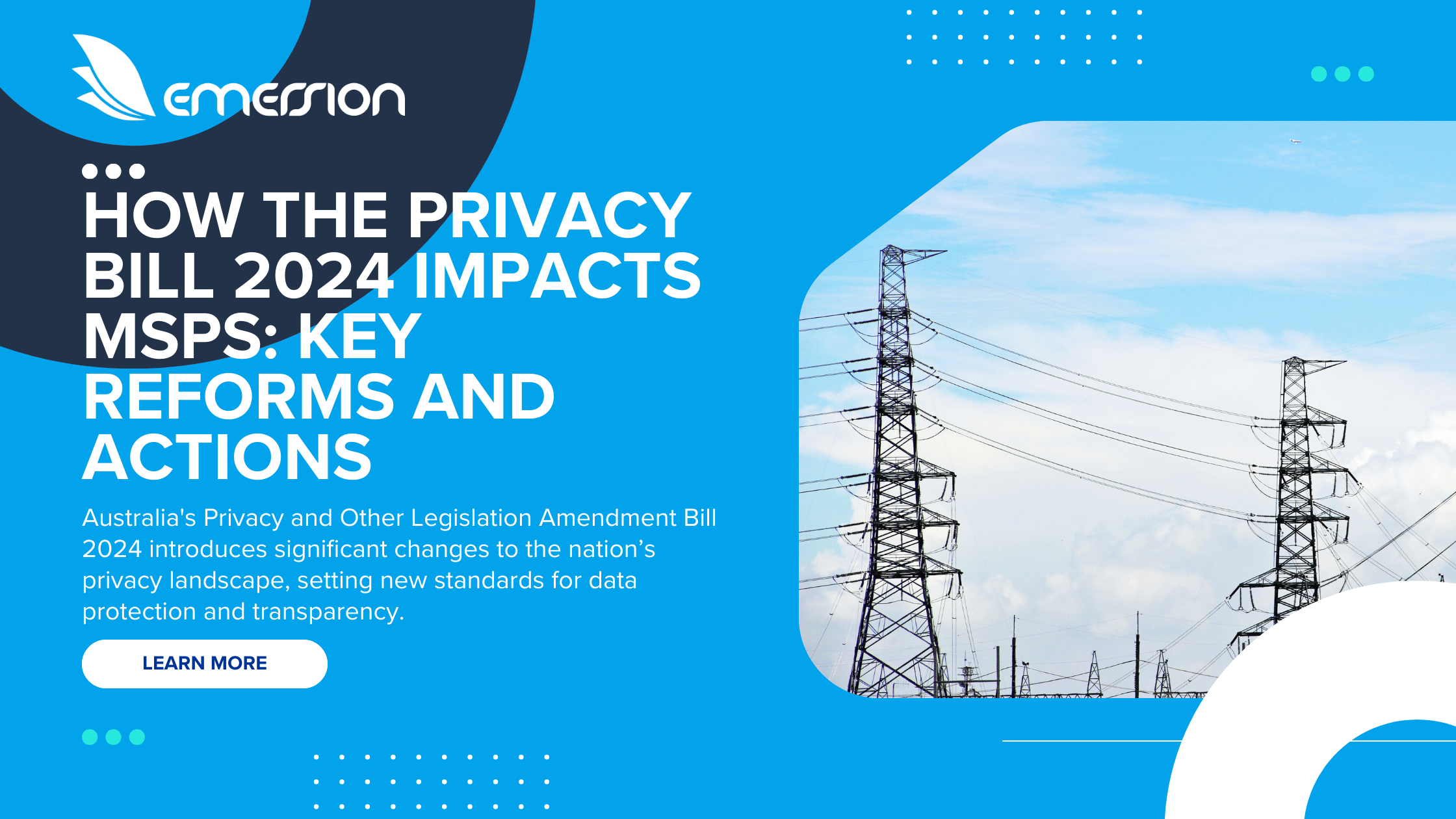How the Privacy Bill 2024 Impacts MSPs: Key Reforms and Actions
Australia’s Privacy and Other Legislation Amendment Bill 2024 introduces significant changes to the nation’s privacy landscape, setting new standards for data protection and transparency. For Managed Service Providers (MSPs), these reforms bring both challenges and opportunities. This blog provides a comprehensive breakdown of the key changes, their implications, and actionable steps MSPs can take to ensure compliance while maintaining client trust.
Key Changes in Privacy Laws
1. Statutory Tort for Serious Invasions of Privacy
- What’s New: Individuals can sue organisations for intentional or reckless privacy invasions, such as unauthorised data sharing or personal information misuse.
- Impact on MSPs: This increases accountability, highlighting the need for strict data handling policies.
2. Criminal Offenses for Doxxing
- What’s New: Publishing personal information with the intent to harass or harm individuals is now criminalised.
- Impact on MSPs: Data management processes must be airtight to avoid inadvertent breaches.
3. Children’s Privacy Protections
- What’s New: MSPs handling minors’ data must comply with stricter safeguards, with the Children’s Online Privacy Code under development.
- Impact on MSPs: Adherence to these specific requirements is mandatory when managing platforms used by minors.
4. Transparency in Automated Decision-Making
- What’s New: Organisations must disclose the use, logic, and potential impacts of automated decision-making systems.
- Impact on MSPs: Transparency in how automation impacts client outcomes is now a compliance priority.
5. Enhanced Data Security Measures
- What’s New: Mandatory implementation of technical (e.g., encryption) and organisational (e.g., training) safeguards.
- Impact on MSPs: Advanced security practices are no longer optional.
6. Overseas Data Transfers
- What’s New: Cross-border data transfers must align with updated mechanisms recognising countries with comparable privacy standards.
- Impact on MSPs: MSPs working internationally must adapt quickly to these changes.
7. Increased Penalties for Privacy Breaches
- What’s New: Substantial fines are now imposed for serious and minor violations.
- Impact on MSPs: Proactive compliance measures are critical to avoid financial and reputational damage.
What It Means for Your Business
These reforms significantly increase the legal and operational requirements for MSPs. To minimise risk, providers must prioritise transparency, implement comprehensive data protection measures, and conduct regular audits to ensure compliance.
Timeline for Implementation
Key Deadlines
- Statutory Tort for Serious Invasions of Privacy: Effective six months after Royal Assent.
- Children’s Online Privacy Code: Implementation pending the finalisation of the code.
- Automated Decision-Making Transparency Requirements: Effective 24 months after Royal Assent.
Implications for MSPs
The Privacy Bill requires MSPs to make substantial adjustments across their operations. Key areas to address include:
- Contractual Revisions: Update contracts, including Master Services Agreements, to reflect new responsibilities and liabilities for privacy breaches.
- Compliance Strategies: Adopt advanced security measures, conduct privacy impact assessments, and maintain transparency in operations.
- Staff Training: Provide comprehensive training on new legal obligations and best practices in data handling and security.
Recommendations for MSPs
To successfully navigate these reforms, consider the following actions:
- Review and Update Contracts: Ensure all agreements reflect the latest legal requirements.
- Enhance Data Security: Adopt advanced encryption, secure hardware, and organisational safeguards such as staff training.
- Foster Transparency: Provide clear explanations of automated decision-making processes to build client trust.
What It Means for Your Business
Non-compliance with these reforms can result in significant fines, operational challenges, and reputational damage. By acting proactively, MSPs can differentiate themselves as trusted partners, ensuring both legal compliance and client satisfaction.
Conclusion
The Privacy and Other Legislation Amendment Bill 2024 introduces pivotal changes to Australia’s privacy laws. For MSPs, adapting swiftly to these changes is essential. By updating contracts, implementing robust security measures, and maintaining transparency, MSPs can navigate the reforms while safeguarding client trust.
Ready to simplify compliance? Contact Emersion today to explore tailored automation and system integration solutions.
Questions to the Reader:
- Are your contracts aligned with the new privacy laws?
- What measures have you implemented to secure personal data effectively?
- How transparent are your decision-making processes?
- Is your staff adequately trained in privacy compliance protocols?
- How prepared is your organisation for the upcoming implementation deadlines?




